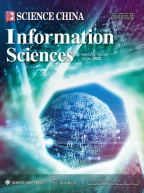Abstract
We consider a two-hop non-regenerative (amplify-and-forward) relay link with one source, one destination and one relay, in which orthogonal frequency division multiplexing (OFDM) is used. The power allocation (PA) to maximize the energy efficiency for the whole link is investigated under quality of service (Qos) requirement and separate power constraints. An approximation method with low complexity is first proposed to convert the PA problem into a quasi-concave problem, which can obtain a tight lower bound in high SNR region. Furthermore, a more accurate approximation method with higher complexity is raised, which can approach the actual performance both in the low SNR and high SNR regions. We also introduce subcarrier pairing scheme to further enhance the energy efficiency for the link. Simulation results are shown to compare the performance of the two proposed methods.
Similar content being viewed by others
References
Laneman J N, Tse D N C, Wornell G W. Cooperative diversity in wireless networks: efficient protocols and outage behavior. IEEE Trans Inf Theory, 2004, 50: 3062–3080
Zhang Q, Zhang J M, Shao C J, et al. Power allocation for regenerative relay channel with rayleigh fading. In: Proceedings of IEEE Vehicular Technology Conference, Los Angeles, 2004. 1167–1171
Zhang J M, Zhang Q, Shao C J, et al. Adaptive optimal transmit power allocation for two-hop nonregenerative wireless relaying system. In: Proceedings of IEEE Vehicular Technology Conference, Los Angeles, 2004. 1213–1217
Hasna M O, Alouini M S. Optimal power allocation for relayed transmissions over rayleigh-fading channels. IEEE Trans Wirel Commun, 2004, 3: 1999–2004
Hammerstrom I, Wittneben A. On the optimal power allocation for nonregenerative OFDM relay links. In: Proceedings of IEEE International Conference on Communications (ICC), Istanbul, 2006. 4463–4468
Hammerstrom I, Wittneben A. Joint power allocation for nonregenerative MIMO-OFDM relay links. In: Proceedings of IEEE International Acoustics, Speech and Signal Processing Conference, Toulouse, 2006. IV
Wang Y, Wu T, Liu B L. Power allocation and subcarrier pairing algorithm for regenerative OFDM relay system. In: Proceedings of Vehicular Technology Conference, Dublin, 2007. 2727–2731
Zhu H, Himsoon T, Siriwongpairat W P. Resource allocation for multiuser cooperative OFDM networks: who helps whom and how to cooperate. IEEE Trans Veh Technol, 2009, 58: 2378–2391
Sung K Y, Hong Y W P, Chao C C. Resource allocation and partner selection for cooperative multicarrier systems. IEEE Trans Veh Technol, 2011, 60: 3228–3240
Zhu H L, Wang J Z. Chunk-based resource allocation in OFDMA systems-part I: chunk allocation. IEEE Trans Commun, 2009, 57: 2734–2744
Zhu H L, Wang J Z. Chunk-based resource allocation in OFDMA systems-part II: joint chunk, power and bit allocation. IEEE Trans Commun, 2012, 60: 499–509
Gamal A E, Mohseni M, Zahedi S. Bounds on capacity and minimum energy-per-bit for AWGN relay channels. IEEE Trans Inf Theory, 2006, 52: 1545–1561
Li G Y, Xu Z K, Xiong C, Yang C Y, et al. Energy-efficient wireless communications: tutorial, survey, and open issues. IEEE Trans Wirel Commun, 2011, 18: 28–35
Chen Y, Zhang S Q, Xu S G, et al. Fundamental tradeoffs on green wireless networks. IEEE Commun Mag, 2011, 49: 30–37
Boyd S, Vandenberghetion L. Convex Optimization. Cambridge: Cambridge Universury Press, 2004
Li Y, Wang W, Kong J, et al. Subcarrier pairing for amplify-and-forward and decode-and-forward OFDM relay links. IEEE Commun Lett, 2009, 13: 209–211
Author information
Authors and Affiliations
Corresponding authors
Rights and permissions
About this article
Cite this article
Yu, H., Qin, H., Li, Y. et al. Energy-efficient power allocation for non-regenerative OFDM relay links. Sci. China Inf. Sci. 56, 1–8 (2013). https://doi.org/10.1007/s11432-012-4770-9
Received:
Accepted:
Published:
Issue Date:
DOI: https://doi.org/10.1007/s11432-012-4770-9
